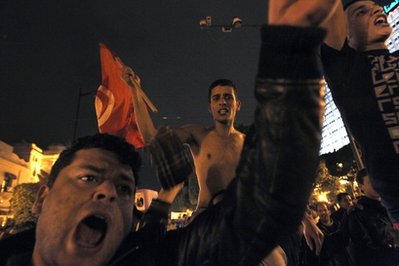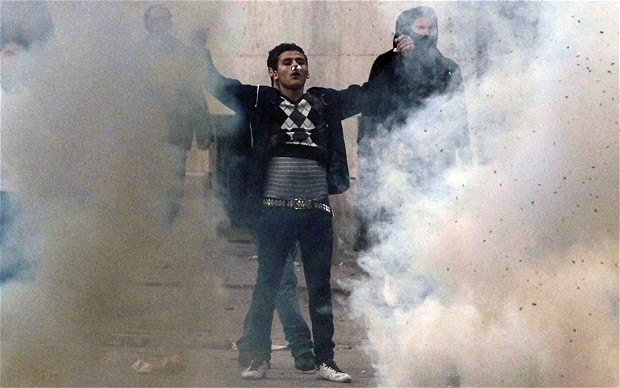
 Thousands of angry demonstrators marched through Tunisia’s capital Friday, demanding the resignation of the country’s autocratic leader a day after he appeared on TV to try to stop deadly riots that have swept the North African nation.
Thousands of angry demonstrators marched through Tunisia’s capital Friday, demanding the resignation of the country’s autocratic leader a day after he appeared on TV to try to stop deadly riots that have swept the North African nation.
Protesters chanted slogans against President Zine El Abidine Ben Ali, including “Ben Ali, out!” and “Ben Ali, assassin!” One poster read “We won’t forget,” a reference to the rioters killed, many by police bullets.
Hundreds of police with shields and riot gear blocked the avenue in front of the Interior Ministry, where over the years there have been reports of torture. The march was organized by Tunisia’s only legal trade union, which also went ahead with a symbolic two-hour strike in the region of the capital.The official death toll in the riots is 23, but opposition figures say dozens more have been killed.
Pent-up anger at unemployment, and at a leadership many see as controlling and corrupt, has exploded into protests and clashes with police over the past few weeks. The demonstrations started in the provinces but this week reached Tunis, the capital of the Mediterranean tourist haven that has long been spared unrest. “We want to end this dictatorship,” said Wadia Amar, a university chemistry professor who demonstrated Friday. “The Ben Ali clan should be brought to justice. They’ve taken everything.”
Facing the worst unrest in his 23 years in power, an unusually contrite Ben Ali went on television Thursday, making sweeping pledges for political and media freedom, saying he he’d leave the presidency when his term ends in 2014, and ordering prices on sugar, milk and bread slashed. After he spoke, buoyant crowds poured into the streets.
A day later, the applause were largely replaced by anger, though a few cries of “Long live Ben Ali” were heard coming from cars that sped down the main avenue.
Ben Ali also said the 75-year age limit on presidential candidates should remain untouched. That would mean Ben Ali, who is 74, would not be able to run for a sixth term in 2014.
The president, who came to power in a bloodless coup in 1987, has prevented potential successors from emerging, sent many opponents to jail or into exile and clamped down on the media and social networking sites.


